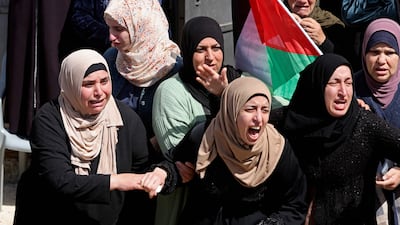Israeli and Palestinian officials are meeting in the Egyptian city of Sharm El Sheikh on Sunday, seeking to de-escalate tensions between the sides.
The high-level security talks at the Red Sea resort city, which are being brokered by regional allies Egypt and Jordan and also the US, aim to end a year-long bout of violence that has claimed the lives of more than 200 Palestinians and more than 40 people in Israel.
The meeting is a continuation of the US-brokered talks hosted by Jordan on February 26 to halt fighting ahead of Ramadan and the seven-day feast of Passover, an important Jewish holiday that coincides with the Muslim holy month this year.
The Sharm El Sheikh round was announced at the end of the February summit in the Jordanian coastal city of Aqaba.
Its objectives, as outlined by a communique in February, are to encourage both sides “to work towards a just and lasting peace” and “commit to de-escalation on the ground”.
The Palestinian side will represented by a delegation headed by Hussein Al Sheikh, the secretary of the Palestinian Liberation Organisation’s executive committee.
The delegation intends to “defend the rights of our Palestinian people to freedom and independence, and to demand an end to this continuous Israeli aggression against our people and to stop all measures and policies that violate their blood, land, property and sanctities”, Mr Al Sheikh said in a statement.
Still, Sunday’s talks have been met with outrage from more hardline Palestinian factions such as the The Democratic Front for the Liberation of Palestine, the Palestinian People’s Party, and the Palestinian Democratic Union, all of whom have issued calls to boycott the meetings.
They said they would not be bound by the outcome of the meeting because it was not the product of any talks within the PLO’s executive committee,
The meeting was also criticised by the Gaza-based Hamas group, whose spokesman Hazem Qassem said on Thursday that the PLO’s participation is a blatant disregard for “the spilt blood of Palestinians”.
Mr Qassem’s sentiments were reiterated by the Iran-backed Palestinian Islamic Jihad, also based in Gaza.
The meeting is a “US plot to end the isolation of the Israeli government,” PIJ spokesman Khaled El Batsh said in a statement. “The (Palestinian) Authority’s participation in it constitutes a lifeline to the right-wing government in Tel Aviv.”
The Israeli delegation will be headed by the country’s National Security Adviser Tzachi Hanegbi, who also led the group at the Aqaba summit.
Shin Bet chief Ronen Bar and Brig Gen Ghassan Alian, the military liaison to the Palestinians, will also attend.
Lofty aspirations
High-level Egyptian foreign affairs officials will be in attendance, the Foreign Ministry said on Sunday.
Despite lofty aspirations, the Aqaba summit accomplished little.
Violence in the Occupied Territories, one of the main talking points of the summit, continued, with two Israeli settlers being murdered by Palestinian gunmen on February 26 as they drove through the village of Huwara.
In response, hundreds of Israeli extremists entered the village, attacking and injuring hundreds of Palestinians.
Israel killed nearly 150 Palestinians in the West Bank and East Jerusalem in 2022, making it the deadliest year in those territories since 2004, according to the Israeli human rights group B'Tselem.
Intensified raids
Far-right members of the Israeli government have been calling for intensified raids on Palestinian homes in the West Bank in a recent crackdown that has been denounced by senior members of the country’s armed forces as being tone deaf to security repercussions amid fears that continued raids could prompt more Palestinian violence, especially during Ramadan.
An Israeli promise in Aqaba for a short-term freeze on “discussing” new settlements or demolishing Palestinian homes was quickly overturned after the meeting when Prime Minister Benjamin Netanyahu issued a statement saying “there is no settlement freeze”.
Other members of his hardline administration issued similar comments following the talks suggesting that any accords reached throughout the meeting would most likely not be implemented.
A marked rise in incidents of settler violence in the occupied territories has been one of the main consequences of the coming to power of the most right-wing government in Israel’s history.
Headed by Mr Netanyahu, Israel’s far-right Likud party secured a majority in the last round of Knesset elections in November.


